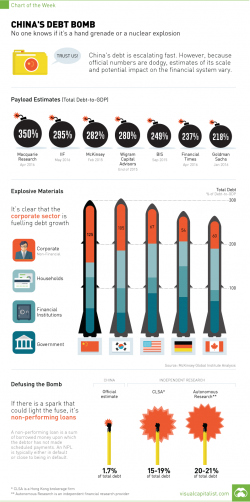China's Debt Bomb: No One Really Knows The Payload

No one knows if it's a hand grenade or a nuclear warhead...
The ramp up in Chinese debt accumulation has been a leading concern of investors for years. The average total debt of emerging market economies is 175% of GDP, and skyrocketing corporate non-financial debt has launched China far beyond that number.
The real question is: by how far?
The answer is disconcerting, as VisualCapitalist's Jeff Desjardins warns, because nobody really knows.

